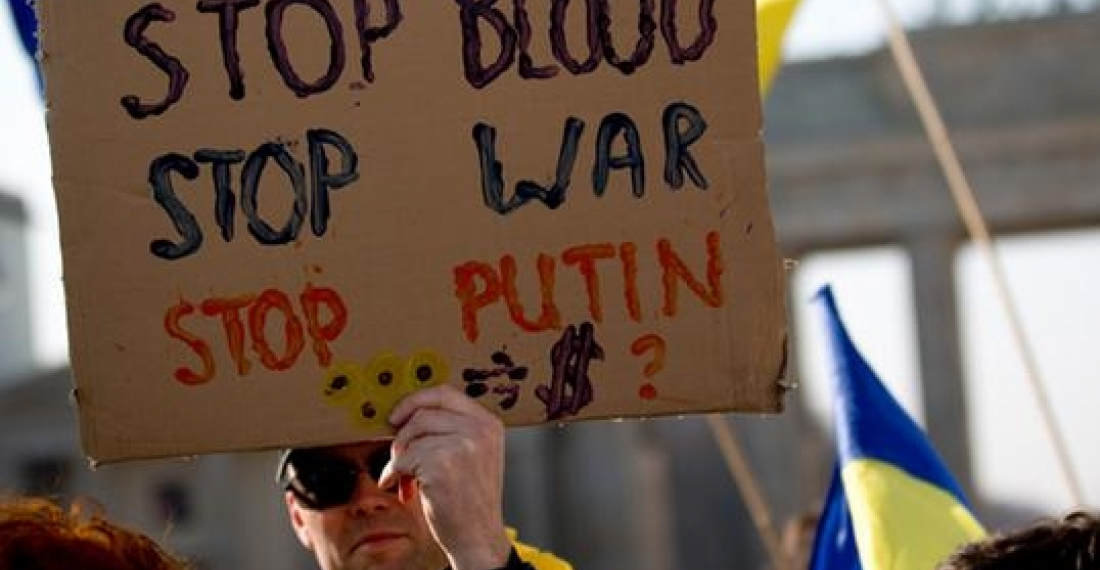This is a commentary prepared by the editorial team of commonspace.eu
The war in Ukraine may be about to enter a new decisive stage. Russia, having failed miserably in its first objective of a swift and largely unopposed occupation of the country, is now trying to cut its losses, whilst securing some strategic victories. Their new objective is to split Ukraine in two, with the Russians occupying the South of the country and its Black Sea coast.
A few weeks ago such a scenario would have been considered a realistic outcome. Six weeks into the war however, the chances of such a Russian victory now appear unlikely. There were two military surprises in this war: the performance of the Ukrainian army which far exceeded expectations, allowing the Ukrainian nation to rally round and stubbornly resist the invasion; and the dismal performance of the Russian army in which the Kremlin had in recent years poured billions, and which was supposed to have been modernised and re-organised to world standards, but whose weaknesses and failures became evident for all to see.
Still, this war has the potential to drag on, in some form or other for a long time, and the new cold war with Russia that it triggered will certainly last years.
The international community, and particularly the European Union - because this remains first and foremost a European problem - has to prepare itself for three huge challenges ahead:
The first is re-building Ukraine. The Economist has just published an estimate of the cost of rebuilding Ukraine after the devastation caused by Russia in the last six weeks, putting the price tag so far at $220bn-540bn. The final figure is likely to be much higher. Yet the world needs to be ready to assist Ukraine in this huge task, so that it can rise from the ashes. Money is however only one of the ingredients necessary. The second needs to be embracing Ukraine so that it can become an EU member in as short a time as possible. Those in Brussels or in the European capitals who persist in looking at the minutia of the acquis communitaire to consider Ukraine's eligibility must be living on another planet. Ukraine has earned its place in the EU on the basis of the blood of its people, and their heroism. The accession process must now reflect this reality. There is still a lot of work to be done, not least because Ukraine itself will not benefit from EU membership unless it also prepares itself for it. But its now a question of "when" not "if".
The second challenge, even more difficult, is that of rebuilding European security. To start, those in the west who remain in denial need to be swiftly convinced of the gravity of the current situation. The possibility of a war with Russia, sooner, if the Ukraine situation escalates, or later, if the current crisis stabilises, is now a distinct possibility. Sitting with Russia to discuss a new European security order is now no longer possible, at least in the short term. Which means that for a while the alternative is the alternative scenario of standing up to Russia. This entails, an expanded and re-organised NATO, with increased capacity, particularly in Eastern Europe; much higher defence budgets, at the expense of other things such as investment in health, education and social cohesion; a re-armament of Germany to enable its army to play a leading role in central and eastern europe; and security arrangements across the globe as part of a Russian containment policy.
The third challenge may be the most daunting. How to deal with Russia itself. Russia is likely to emerge from the war in Ukraine, and the subsequent international response to its actions, weakened and wounded, but not defeated. It will be a country whose leadership is guilty of war crimes, and on which Ukraine will have serious claims for reparations. That will in the short term make Russia even more dangerous. In such circumstances one would expect that the Russian people will themselves see the errors of their leaders and take steps accordingly. But in the short term a complete change of the system is unlikely. Containing Russia whilst encouraging change from within will be a very difficult balance to strike. It will require a unity of purpose by Europe and its western allies, and perseverance.
On all three challenges ahead work must start now, even as the war in Ukraine rages on, and its outcome remains unclear. But to start, all European, from the leaders at the top, to the citizens at the grass roots must accept the truth as it is: there is now a new reality which requires a different response; there is a huge cost, which all Europeans will be expected to pay; there are risks and dangers that we all thought were buried in the past, which now need to be prepared for. Europe has the strength and the resilience, the resources and the capacities, necessary to deal with these challenges as long as the enormity of the current and emerging situation is well understood, and properly addressed.







